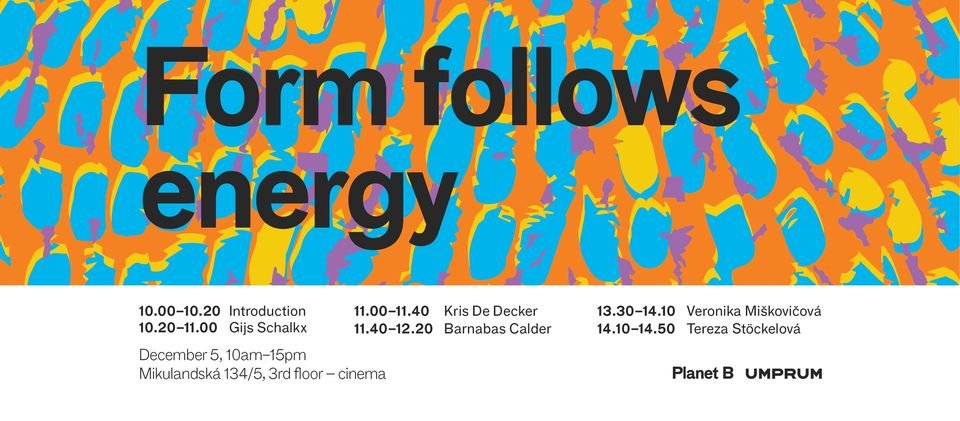5th December 2022, from 10am to 3 pm
Technological center UMPRUM, Mikulandská 134/5, Prague 1, 3rd floor, cinema-lecture hall
The unifying theme of the second symposium on Planet B is "energy" - whether from a physical, technological or psychological point of view. The aim of the symposium is to introduce students to other sources of energy and their mutual transformations than just nuclear energy which is the central theme of the semester.
The speakers from a variety of backgrounds will talk about their work in this field and introduce a range of subtopics such as low-tech solar panels, DIY combustion engines, historical development of architecture from the perspective of energies etc.
//
PROGRAMME
10.00–10.20 Introduction
10.20–11.00 Gijs Schalkx // DIY power plant // DIY combustion engine
11.00–11.40 Kris De Decker // What the solar panel can learn from the sailboat
11.40–12.20 Barnabas Calder // Form Follows Fuel
---
13.30–14.10 Veronika Miškovičová // Energy from microorganisms
14.10–14.50 Tereza Stöckelová // Biosocial metabolism and nonhuman labour
//
GUESTS
Gijs Schalkx, artist, designer & inventor of the greenest fuel in the world.
A quest on keeping the combustion engine alive & building my own energy infrastructure.
*
Kris De Decker is the creator and author of Low-tech Magazine.
/ What the solar panel can learn from the sailboat /
Technology has become the idol of our society, but technological progress is—more often than not—aimed at solving problems caused by earlier technical inventions. In contrast, there is a lot of potential in the past and often forgotten knowledge and technologies when it comes to designing a sustainable society. Interesting possibilities arise when you combine old technology with new knowledge and new materials, or when you apply old concepts and traditional knowledge to modern technology.
*
Barnabas Calder is author of Architecture: From Prehistory to Climate Emergency (Pelican, 2021) and Raw Concrete: The Beauty of Brutalism (William Heinemann, 2016). He is a trustee of the Society of Architectural Historians of Great Britain and a Senior Lecturer at the University of Liverpool School of Architecture.
/ Form Follows Fuel /
Energy has always been the single biggest factor in shaping the development of architecture, going back to the earliest architecture we can trace, and continuing into today's urgent need to escape our architecture's powerful dependency on fossil fuel energy.
*
Veronika Miškovičová
The potential of carbon sequestration from the surrounding environment using algal biotechnologies. About microalgae, the possibilities of cultivation and utilization of biomass, up to the use of technologies and crafts to create symbiotic communities between humans and non-humans.
*
Tereza Stöckelová is a researcher at the Institute of Sociology of the Czech Academy of Sciences, and an associate professor at the Department of Sociocultural Anthropology, Charles University. Her work is situated in-between sociology, social anthropology and science and technology studies (STS), and draws upon actor network theory and related material semiotic methodologies. She investigated academic practices in the context of current policy changes, science and society relations, environmental controversies, and the interfaces between biomedical and alternative therapeutic practices. Her current research maps out how embodied subjectivities, biosocialities, and state governance are being (re)configured in relation to microbial and fungal agents. Since 2020 she is a member of the World Commission on the Ethics of Scientific Knowledge and Technology, an advisory body and forum of reflection set up by UNESCO.
/ Biosocial metabolism and nonhuman labour /
The paper considers energy in relation to organic matter. How is energy assumed and mediated by the living forms? What are the political and social implications of more-than-human energy flows? What are the ways to articulate recognition, solidarity and justice of processes in which energy, labour and waste are (re)distributed in the wider biosocial metabolism? The paper will draw on my current research on microbiological citizenship.

